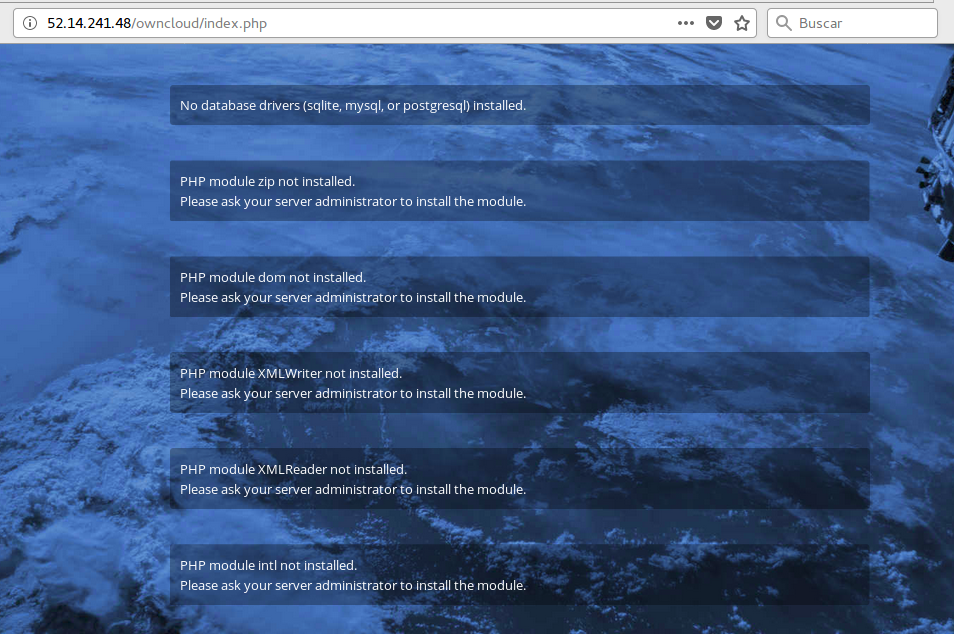Owncloud Php Module Zip Not Installed

Hello, I have a problem in recent weeks. I would like to install ownCloud on a website but the cPanel tells me he misses two PHP extensions that are 'zip' and 'mb multibytes'.
Cara Instal Driver Printer Epson Lx 300 Di Windows Xp. Steps to reproduce during the installation at the page localhost/owncloud/ Expected behaviour get to the web navigator in order to configure the server.
After several searches and attempts to solve the problem, I can not install these extensions with the command>yum install php-zip There would be a problem with the mirrors links in my server. I.gyazo.com/cdce280b4ccefdd5f7b7e743f4e5c479.png How to solve this problem please? I'm on Centos 6.7 and I have root access to the server and the WHM. Thanks in advance, Yann.
Prerequisites The ownCloud.tar archive contains all of the required PHP modules. This section lists all required and optional PHP modules. Consult the for more information on modules. Your Linux distribution should have packages for all required modules. You can check the presence of a module by typing php -m grep -i. If you get a result, the module is present.
Note SMB/Windows Network Drive mounts require the PHP module smbclient; se Web Retur Barang Gudang Menggunakan Php. Create Dbf File With Php. e. Recommended for specific apps ( optional): • PHP module exif (for image rotation in pictures app) • PHP module gmp (for SFTP storage) For enhanced server performance ( optional) select one of the following memcaches: • PHP module apc • PHP module apcu • PHP module memcached • PHP module redis (>= 2.2.6+, required for Transactional File Locking) See to learn how to select and configure a memcache. For preview generation ( optional): • PHP module imagick • avconv or ffmpeg • OpenOffice or LibreOffice For command line processing ( optional): • PHP module pcntl (enables command interruption by pressing ctrl-c) You don’t need the WebDAV module for your Web server (i.e. Apache’s mod_webdav), as ownCloud has a built-in WebDAV server of its own, SabreDAV.
If mod_webdav is enabled you must disable it for ownCloud. (See for an example configuration.). Apt-get install apache2 mariadb-server libapache2-mod-php5 apt-get install php5-gd php5-json php5-mysql php5-curl apt-get install php5-intl php5-mcrypt php5-imagick • This installs the packages for the ownCloud core system. Libapache2-mod-php5 provides the following PHP extensions: bcmath bz2 calendar Core ctype date dba dom ereg exif fileinfo filter ftp gettext hash iconv libxml mbstring mhash openssl pcre Phar posix Reflection session shmop SimpleXML soap sockets SPL standard sysvmsg sysvsem sysvshm tokenizer wddx xml xmlreader xmlwriter zip zlib.
If you are planning on running additional apps, keep in mind that they might require additional packages. See for details.
• At the installation of the MySQL/MariaDB server, you will be prompted to create a root password. Be sure to remember your password as you will need it during ownCloud database setup. Now download the archive of the latest ownCloud version: • Go to the. • Go to Download ownCloud Server >Download >Archive file for server owners and download either the tar.bz2 or.zip archive. • This downloads a file named owncloud-x.y.z.tar.bz2 or owncloud-x.y.z.zip (where x.y.z is the version number). • Download its corresponding checksum file, e.g. Owncloud-x.y.z.tar.bz2.md5, or owncloud-x.y.z.tar.bz2.sha256.
• Verify the MD5 or SHA256 sum. Php-fpm Configuration Notes Security: Use at least PHP =>5.5.22 or >= 5.6.6 Due to in older PHP releases with the handling of XML data you are highly encouraged to run at least PHP 5.5.22 or 5.6.6 when in a threaded environment. System environment variables When you are using php-fpm, system environment variables like PATH, TMP or others are not automatically populated in the same way as when using php-cli.
A PHP call like getenv('PATH'); can therefore return an empty result. So you may need to manually configure environment variables in the appropropriate php-fpm ini/config file. Here are some example root paths for these ini/config files: Ubuntu/Mint CentOS/Red Hat/Fedora /etc/php5/fpm/ /etc/php-fpm.d/ In both examples, the ini/config file is called www.conf, and depending on the distro version or customizations you have made, it may be in a subdirectory. Usually, you will find some or all of the environment variables already in the file, but commented out like this. $ printenv PATH /home/user/bin:/usr/local/sbin:/usr/local/bin:/usr/sbin:/usr/bin: /sbin:/bin:/ If any of your system environment variables are not present in the file then you must add them. When you are using shared hosting or a control panel to manage your ownCloud VM or server, the configuration files are almost certain to be located somewhere else, for security and flexibility reasons, so check your documentation for the correct locations.